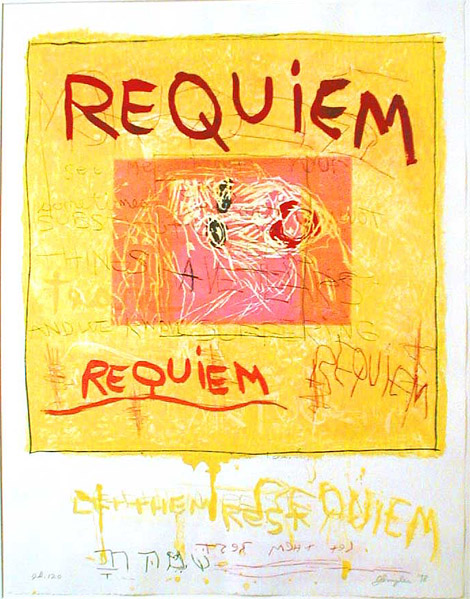|
In Lines of Visions: Drawings by Contemporary Women (NY: Hudson Hills Press, 1989), the catalogue that accompanied an important touring show, Joan Snyder describes the way she works: "The process of making images is always going on on several layers at once, and I know it is important for me to keep scribbling because in a few years those will be the ideas ready to become paintings" (p. 131). In Snyder's case, this is absolutely true. During the summer of 1998 we were able to see a show of her recent works at Hirschl & Adler, her New York City gallery, and among the works was a drawing containing the central element of our print along with several variants on the theme. Snyder, a strong figure in the feminist art movement, has a B.A. in sociology and her work combines an interest in the process by which images are made with an interest in the anxiety produced by living in a world that puts person against person, gender against gender, class againast class, society against society. Much of her work, according to an essay by Ruth E. Fine in A Graphic Muse: Prints by Contemporary American Women (New York: Hudson Hills Press, 1987), by Fine and Richard D. Field, "alludes to violence, violation, sadness, change, love, pain, joy," adding, "She is concerned with the possibility of an expressive exploration of the universality of our private experiences. Her source is her own psyche, as she seeks to present an underlying mythology to sustain humanity through turmoil." Over twenty years ago, Michael Walls, the then-director of the Anderson Gallery at Virginia Commonwealt University, wrote in a volume that accompanied a touring museum show, that Joan Snyder is "one of the truly individual painters of her generation," and suggested that the two things that most set her works apart from those of her peers were "their multifaceted nature and intentions and the individuality, or separateness, of each painting in relation to other paintings which she has completed within a given period of time" (Joan Snyder [San Francisco Institue of Art, 1979]. p. 11).
Snyder's works, in short seem to come out of intensely personal repsonses, built up over time, come to fruition, and give way to the next work upon which she has been brooding, each sparate, yet each united by a core commonality not of image but of response to the reality of life in the contemporary world. The subject in 1994 of a 25-year traveiling retropective that led to a feature essay in the October 1994 Art in America (120-123 + 157) by Bill Jones, Snyder has fulfilled the promise that critics saw even at the beginning of her professional career as an artist 30 years ago, "What strikes one again and again is Snyder's ability, within each work, to go from micro to macro: from the circumstances of her life and surroundings to universal conditions, from the material presence of paint-canvas-and-whatever to an intense empathy for a world in pain, from a brushstroke to a resonant metaphor, from the confines of the studio to the infinity of the cosmos." Jones continues, "It seems clear to me that Snyder draws her strength for these artistic/spiritual journeys from a fervant "religion of painting" that is part Neolithic-era magic, part Catholic transubstantiation, part Jewish mysticism, part fertility cult, part modernist innovation, part classical sense of formal balance" (157). Our print began as a cry of rage at the death of a friend from AIDS, but grew as she worked on it into an expression of grief and a hope for peace to all those who live in our wounded world.
Selected Bibiography: Kenneth Baker, Joan Snyder & Pat Steir (Boston: Institute of Contemporary Art,, 1974); Carl Belz, Joan Snyder: 1969 to Now (Waltham: Rose Museum, Brandeis University., 1994); Hayden Herrera, Joan Snyder (NY: Abrams, 2005), Michael Walls, Joan Snyder (San Francisco: San Francisco Art Institute, 1979).
|
|
